I was channel surfing the other day and stumbled upon a Dogs 101 episode with Shiba Inus. They characterized Shiba Inus as “one of the most difficult breeds to train”.
- Why is a Shiba Inu difficult to train?
- What makes a Shiba Inu more difficult to train than other dog breeds?
Of course a Shiba is stubborn and strong-willed, but then so are many other breeds, including the Siberian Husky. Why then are Shibas more challenging to train than other strong-willed breeds?

1. A Shiba Will Do What a Shiba Wants
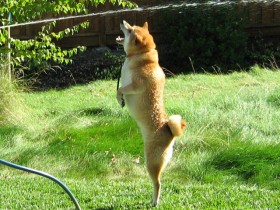
A Shiba Inu will only respond to activities that makes sense to him, and not necessarily to you. The good news is a Shiba is not shy about letting you know what he likes, and what he wants!
Shiba owners usually listen carefully to their dogs, and personalize training methods to suit individual preferences and temperaments.
Shibas also think for themselves, and are very motivated to come up with alternate ways to reach their goals. As a result, training a Shiba Inu is often counter-intuitive, and traditional dog training methods may not work well.
Shiba owners must be creative and flexible.
A Shiba may follow commands if they make sense to him. Other times, he will do something else that ROCKS!

Some people may reason that since Shiba Inus are independent thinkers, they would respond better to aversive training techniques, such as collar corrections or alpha rolls.
This is false.
Shiba Inus are also extremely strong-willed and stubborn. They will fight back if they feel threatened. I started with aversive training techniques, and my Shiba Sephy fought me every step of the way. The more a dog practices fighting back, the more likely he will repeat that behavior and develop aggression issues down the road. Sephy was surely heading that way, which was why I started looking into alternative training methods.
Aversive techniques also made Sephy lose trust in me.
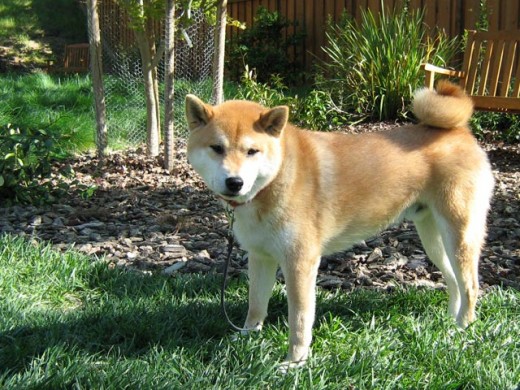
2. A Shiba Inu Will Not Surrender Even When All Is Lost
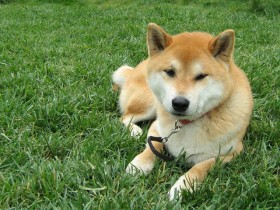
All dogs think for themselves. They have their own needs, which may not always coincide with ours.
Strong-willed dogs are not afraid to push their own agenda, even if it puts them in conflict with us and other dogs.
However, even strong-willed breeds like the Siberian Husky will give up the ghost when they see that the effort and time involved, is not worth the end result.
On the other hand, Shiba Inus have a very …
singular state of mind.
~~[ Geoge ]

Once a Shiba starts to focus on something, he may quickly become obsessed. When in that singular state of mind, it is difficult to distract Shiba and get him to do something else.
When Sephy gets into that obsessive state, he will not give up no matter what. Even if things look hopeless, he will not surrender. The more I try to force him to comply, the more he will dig in his paws and not budge.
For Shiba Inu Sephy, giving-up is simply not an option.
It seems that any kind of concession will deal such a grievous blow to his Shiba pride that he is willing to do whatever it takes to protect it. Sephy is willing to endure pain, not eating, not going for his walks, not getting affection or attention, losing his freedom, and much more; when his Shiba Honor is on the line.
This great quote from the I am Shiba blog sums it up very well
I Am Shiba. Seppuku will not be enough.
The best way of getting Sephy to do something is not to make it into a challenge or a fight. If Sephy does not want me to brush his teeth, he does not get his usual melted cheese and chicken meal. I will simply go back to my tasks, and when I am free, I try again. By then, he is usually hungry and in a different state of mind.
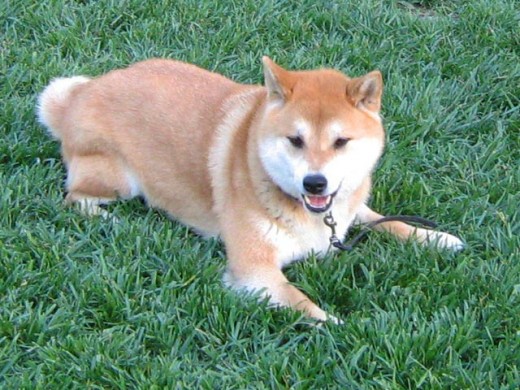
3. A Shiba Inu Has the Heart of a Rebel

Shiba Inus are often characterized as independent, aloof, and more like a cat.
I think that Shibas are independent minded, but they actually want and enjoy a fair bit of human attention; perhaps more so than many other dog breeds.
Unlike other dogs however, Shibas are not necessarily looking for positive attention. With Sephy, any type of attention will do; as long as it is big, all-eyes-on-Shiba, high quality attention.
Negative human attention is easier to obtain, more intense, and usually lasts for a longer duration.
As such, this is the type of attention that Shiba Sephy usually strives for, not unlike an online troll. If he is able to get my goat, he will. If he is able to get my goat and start a fun chasing game, that is even better!
If I tell Sephy not to do something, he will definitely try to do it the first chance he gets. He is sneaky and will do it when my back is turned. However, if I am not home, he spends most of his time sleeping because he does not have an audience.
The “game” is only fun when there is a real danger of being caught, and the possibility of escape. An audience is also necessary to see his God-like Shiba-ness.
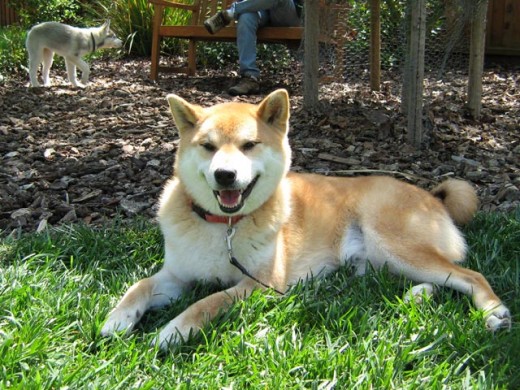
I have since learned that one of the best ways to deal with Shiba-hijinks is to stay above the fray and ignore my attention-seeking Shiba. Sephy does not like being ignored. He will go to great lengths to get the attention of those that seem disinterested in him – even if it means following commands!
What to you think?
- Are Shiba Inus one of the most difficult breeds to train?
- What makes a Shiba Inu difficult to train?
- Which dog breeds, do you think, are more difficult to train than a Shiba?
Many thanks to Kblover & Wally, Brett & Ziva, Andrea & Kiba, Zuko’s Mom & Zuko, Geoge & Rusty, as well as Jess & Zeus, for sharing their Shiba Inu stories and many dog experiences. I made many changes to the article above based on their comments.
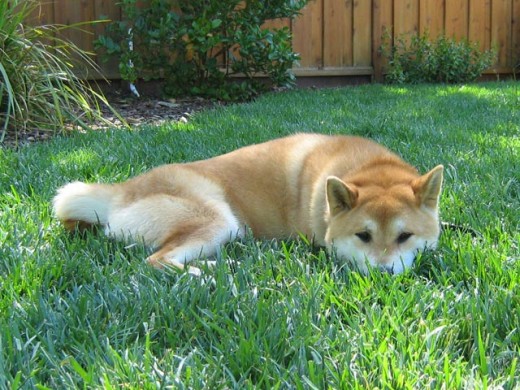
I think Andrea hit the nail on the head: “So, I guess maybe Shiba’s aren’t easy to train to do what you want – but I’m mostly okay with him doing what he wants within the boundaries of the household rules (no biting, no chewing on the walls and furniture, no bolting out the front door, etc).”
This describes Ziva to a tee. She’s also rather cut her own throat rather than soil “her” house.
What a great discussion! I will summarize here and probably also update the article later on.
Why are Shiba Inus one of the most difficult breeds to train?
1. Shibas will do what Shibas want. Sometimes, they will follow commands if it makes sense to them. Other times, they will do something else that ROCKS!, like
2. Well-trained Shiba adults are easier to live with because they have less energy than puppies. They may still challenge their owners, but they are also happy sunning themselves and chilling out. For this reason, it may make sense to adopt an adult Shiba from an accredited breeder or from a Shiba rescue.
3. Shibas think for themselves and are motivated to come up with alternate ways to get what they want. As a result, training a Shiba Inu can often be counter-intuitive and traditional dog training methods may not always work on them. Shiba owners must be creative and flexible.
4. Shibas will only respond to activities that makes sense for them, and not necessarily for you. The good news is that Shibas are not shy about letting their owners know what their needs and preferences are! Shiba owners usually listen carefully to their dogs and personalize their training methods to suit individual preferences and temperaments.
** It also looks like the non-food focused thing is more of a Sephy specific trait rather than a breed trait.
5. Shibas have a very –
Once they are focused on something, they often become obsessive over it. Depending on the object of Shiba’s obsession, this may complicate training. Once in that state of mind, it is difficult to distract Shiba and get him to do something else.
Great stuff so far! Thanks for all your awesome insights, and please continue to add more! 😀
Another great article, Shibashake – and so true. I attempted to play video games with a friend last night and Zeus was pretty appalled that we were not paying attention to him or throwing his bed (new favorite toy unfortunately). He began to head butt us, run the 500 around the tv, tug on my socks, pelt himself against the walls (yes I’m serious) and so forth. I tried to ignore him knowing that he wanted attention at which point he began to chew the couch while making his bizzarre shiba noises. He knows I won’t let him destroy the furniture – so alas I had to get him the attention he was demanding. Needless to say, sir Zeus ended up with a time out in the bathroom. Another day in the life of shiba mothering…
LOL Jess. Never a dull moment with a Shiba! 😀
Also thanks a bunch for the book recommendation. Definitely looks like a very interesting story from a very original perspective.
My shiba, Rusty, is about 6 years old and has never been easy to train. However, he tends to respond to activity that makes sense to him from a dog stand point. While I would not ever let him loose from a leash, when walking he responds to small tugs in different directions as we walk. When waiting to cross a street where cars are passing, he generally stands and waits if I use a calming tone of voice. When I take him out for a walk, I first leash him by standing near a couch upon which he jumps so I can attach the leash.
He is extremely food-driven but is so focused on obtaining the food that he cannot be distracted from that singular state of mind.
I think that maybe the Shiba reputuation as “difficult dogs” has to do mmore with age than anything else. I get the impression that Shibas are very difficult to train as puppies–not having had Ziva as a puppy, I can’t swear to it, but most owners describe these horrific puppyhoods full of willful misbehavior. Like most shelter dogs, Ziva was tentative and very polite when she came home with me. Combine that with having some age on her and at least one litter of puppies (that we know if) in her past, I think she was more settled and more eager to please. She will actually heal off leash, but I make sure I work with her only in carefully controlled situations for her own safety. 9 times out of 10 she will do exactly what I ask of her–it’s just that 10th time when she wants to say “hi” to the neighbor who’s got a hamburger on the grill that all bets are off.
It could be that the Shiba personality just works better for us. 🙂
Kiba reminds me a lot of my toddler. He doesn’t always do what I want him to, but he’s smart and knows when he can push things and when he can’t. Maybe having small boys just makes his antics seem more “normal”. Our old dog was much more “dog like” and made me quite crazy!
I really like the fact that Kiba thinks for himself and is motivated to come up with alternate ways to get what he wants. I also enjoy the fact he can be so committed to a pout or other mood that food treats don’t change his mind. 🙂 I think that’s more “human” and I understand it a little better.
The potty training thing was HUGE. My parents have a dog they got at the same time and she still makes mistakes – Kiba would rather cut his own throat than pee in the floor. 🙂
My husband does a very funny, deep voice for Kiba when he gives us the patented Shiba “look” during which he lectures us on honor and pride and why the fact that I’ve rolled him on his back to brush his belly is really beneath his dignity.
So, I guess maybe Shiba’s aren’t easy to train to do what you want – but I’m mostly okay with him doing what he wants within the boundaries of the household rules (no biting, no chewing on the walls and furniture, no bolting out the front door, etc). I couldn’t care less if he sits when I want him to sit so his hit or miss response to such things doesn’t really phase me.
Zuko is strong willed, but VERY food motivated. We were lucky in that aspect. He’ll give it all up for some cheddar cheese. But we also did our homework, went to training classes, looked at different methods and adjusted our style to find what worked best. He’s good (mostly) at recall, he doesn’t pull on leash, bolt out the door. He has his off days, but he’s unique and just overall, a very good dog. And I agree that Shibas need human attention but not necessarily in the lap-dog / snuggly way.
Yeah Zuko sounds like a very awesome boy.
In truth, Sephy is a pretty good boy too, so the good news is that Shibas can be re-trained even after I screwed up at the beginning of our training program. He is also a lot less work in terms of energy and exercise.
Overall, however, Sephy has a more stressed-out personality than my Sibes, and he is definitely a lot more stubborn. When Sephy is in one of his rogue moods, he goes all the way. I suppose another way of putting it is that Sephy is very committed to the things that matter to him. When he really wants to play chase, he is willing to do whatever it takes to start up a game. 😀
In my experience, Sibes require a lot of patience to train, but Shibas require even more!
Another thing I have noticed is that most Shiba owners know a lot about dog training. Just from looking at the nihonken shiba forums, as well as the shiba meetup forums, there is a wealth of useful information there. I think a big part of this is because a Shiba requires a good amount of knowledge to train, whereas this may be less true for breeds that are not as stubborn or strong-willed.
Honestly, compared to our old dog, Kiba hasn’t been hard to train at all.
Of course, we did so much breed research that, like Brett, I was expecting a nightmare, so anything short of that seems fine.
Your old dog is a lab/border collie mix? That is really interesting. In what way is your older dog harder to train? Was it an energy issue? I know that border collies have crazy energy, but it seems that they also really want to work.
Since Ziva is my first Shiba, I hesitate to vote on the ‘difficult breed’ question. Also, I got her from a shelter, and she was about 3 years old when I got her. While I find her to be situationally stubborn, I have to say she caught on really quickly to the “rules” (such as they are) of the house. Just a couple of examples–I don’t think she’d ever been on a leash, but she got with the program within hours. She was bad about attempted door bolting, but after about a month of “NOs” she now waits until I tell her it’s OK to come out (onto the gated porch, with all gates closed). You literally have to “invite” her two or three times if she’s not on the leash. That being said, if she sees something she wants badly (usually another dog, me in the car, or food), she will defy all of her ‘training’ and just go for it. Overall, I’d say she was MUCH easier to work with than I had expected, but I also researched her breed extensively before I brought her home, and I was kind of expecting a horror story :-).
This is a very interesting point, and is definitely my experience with Sephy as well.
I think all dogs will sometimes ignore commands or rules. Strong-willed dogs probably do it more often than the average dog. Shibas, I think, do it more than even strong-willed dogs. Sephy definitely breaks the most rules and challenges me the most. 😀
LOL, yeah I agree with you and Adrea that research is key. I think that training a Shiba can be very counter-intuitive. Also many traditional techniques may not work with them.
I did not do enough research initially, and ended up with a horror story – very quickly. Luckily, it got better. 😀
It sounds like they are more difficult mostly because they require creativity as well as good attention to the things that motivate them. That and food isn’t their #1 motivation.
I think it also is the “battle of wills” mentality to training that’s still common. “I’m gonna make him do it because I need to be dominant” type of thing, which seems as though you’ll just get a fight, not submission.
I think for an owner that can do these things, Shibas might be EASIER than some who live only for food (what happens when you don’t want to smell like a hot dog stand?) are probably less prone to being bribed, avoiding another common trap.
Hey KB,
Very good to see you. I didn’t know you started your own blog – Excellent!
Have you decided to leave HP after the Google update? I moved some of my articles away, but I am still going to leave a few behind.
Yeah this is unfortunate, but I think more natural to us humans. As Aesop would say, “Persuasion is better than force.”
Heh – I don’t know about that. Food focused dogs are a lot of fun to train. I just keep their meal kibble with me in a bag and use it to help train them to meet people, leave dangerous objects, etc. I keep the reinforcement schedule varied, so they will follow commands even when I don’t have food with me.
Also, I am not sure why food is so often viewed as “bribery”, whereas affection, playing a chase game, or some other reward is viewed differently. The way I see it –
Dogs think for themselves so they need to be motivated to perform certain behaviors or stop performing other behaviors. Food is just one motivator among many. Poking a dog, collar corrections, alpha rolling a dog, playing a chase game, and affection are other motivators. If we view using a motivator as bribery, then all of these techniques are also bribery.
In truth, I have never understood why food has so many negative associations. I can understand why applying pain is risky and can lead to a lower quality of life. However, the only risk food carries is one of obesity, and that can be easily avoided.